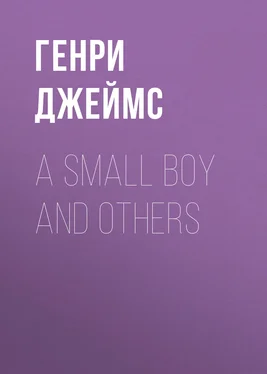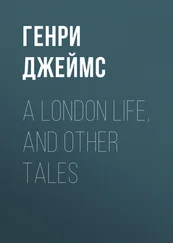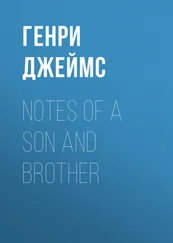Генри Джеймс - A Small Boy and Others
Здесь есть возможность читать онлайн «Генри Джеймс - A Small Boy and Others» — ознакомительный отрывок электронной книги совершенно бесплатно, а после прочтения отрывка купить полную версию. В некоторых случаях можно слушать аудио, скачать через торрент в формате fb2 и присутствует краткое содержание. Жанр: foreign_prose, foreign_antique, на английском языке. Описание произведения, (предисловие) а так же отзывы посетителей доступны на портале библиотеки ЛибКат.
- Название:A Small Boy and Others
- Автор:
- Жанр:
- Год:неизвестен
- ISBN:нет данных
- Рейтинг книги:5 / 5. Голосов: 1
-
Избранное:Добавить в избранное
- Отзывы:
-
Ваша оценка:
- 100
- 1
- 2
- 3
- 4
- 5
A Small Boy and Others: краткое содержание, описание и аннотация
Предлагаем к чтению аннотацию, описание, краткое содержание или предисловие (зависит от того, что написал сам автор книги «A Small Boy and Others»). Если вы не нашли необходимую информацию о книге — напишите в комментариях, мы постараемся отыскать её.
A Small Boy and Others — читать онлайн ознакомительный отрывок
Ниже представлен текст книги, разбитый по страницам. Система сохранения места последней прочитанной страницы, позволяет с удобством читать онлайн бесплатно книгу «A Small Boy and Others», без необходимости каждый раз заново искать на чём Вы остановились. Поставьте закладку, и сможете в любой момент перейти на страницу, на которой закончили чтение.
Интервал:
Закладка:
VI
I see a small and compact and ingenuous society, screened in somehow conveniently from north and west, but open wide to the east and comparatively to the south and, though perpetually moving up Broadway, none the less constantly and delightfully walking down it. Broadway was the feature and the artery, the joy and the adventure of one's childhood, and it stretched, and prodigiously, from Union Square to Barnum's great American Museum by the City Hall—or only went further on the Saturday mornings (absurdly and deplorably frequent alas) when we were swept off by a loving aunt, our mother's only sister, then much domesticated with us and to whom the ruthless care had assigned itself from the first, to Wall Street and the torture chamber of Dr. Parkhurst, our tremendously respectable dentist, who was so old and so empurpled and so polite, in his stock and dress-coat and dark and glossy wig, that he had been our mother's and our aunt's haunting fear in their youth as well, since, in their quiet Warren Street, not far off, they were, dreadful to think, comparatively under his thumb. He extremely resembles, to my mind's eye, certain figures in Phiz's illustrations to Dickens, and it was clear to us through our long ordeal that our elders must, by some mistaken law of compensation, some refinement of the vindictive, be making us "pay" for what they in like helplessness had suffered from him: as if we had done them any harm! Our analysis was muddled, yet in a manner relieving, and for us too there were compensations, which we grudged indeed to allow, but which I could easily, even if shyly, have named. One of these was Godey's Lady's Book, a sallow pile of which (it shows to me for sallow in the warmer and less stony light of the Wall Street of those days and through the smell of ancient anodynes) lay on Joey Bagstock's table for our beguilement while we waited: I was to encounter in Phiz's Dombey and Son that design for our tormentor's type. There is no doubt whatever that I succumbed to the spell of Godey, who, unlike the present essences, was an anodyne before the fact as well as after; since I remember poring, in his pages, over tales of fashionable life in Philadelphia while awaiting my turn in the chair, not less than doing so when my turn was over and to the music of my brother's groans. This must have been at the hours when we were left discreetly to our own fortitude, through our aunt's availing herself of the relative proximity to go and shop at Stewart's and then come back for us; the ladies' great shop, vast, marmorean, plate-glassy and notoriously fatal to the female nerve (we ourselves had wearily trailed through it, hanging on the skirts, very literally, of indecision) which bravely waylaid custom on the Broadway corner of Chambers Street. Wasn't part of the charm of life—since I assume that there was such a charm—in its being then (I allude to life itself) so much more down-towny, on the supposition at least that our young gravitation in that sense for most of the larger joys consorted with something of the general habit? The joy that had to be fished out, like Truth, from the very bottom of the well was attendance at Trinity Church, still in that age supereminent, pointedly absolute, the finest feature of the southward scene; to the privilege of which the elder Albany cousins were apt to be treated when they came on to stay with us; an indulgence making their enjoyment of our city as down-towny as possible too, for I seem otherwise to see them but as returning with the familiar Stewart headache from the prolonged strain of selection.
The great reward dispensed to us for our sessions in the house of pain—as to which it became our subsequent theory that we had been regularly dragged there on alternate Saturdays—was our being carried on the return to the house of delight, or to one of them, for there were specifically two, where we partook of ice-cream, deemed sovereign for sore mouths, deemed sovereign in fact, all through our infancy, for everything. Two great establishments for the service of it graced the prospect, one Thompson's and the other Taylor's, the former, I perfectly recall, grave and immemorial, the latter upstart but dazzling, and having together the effect that whichever we went to we wondered if we hadn't better have gone to the other—with that capacity of childhood for making the most of its adventures after a fashion that may look so like making the least. It is in our father's company indeed that, as I press the responsive spring, I see the bedizened saucers heaped up for our fond consumption (they bore the Taylor-title painted in blue and gilded, with the Christian name, as parentally pointed out to us, perverted to "Jhon" for John, whereas the Thompson-name scorned such vulgar and above all such misspelt appeals;) whence I infer that still other occasions for that experience waited on us—as almost any would serve, and a paternal presence so associated with them was not in the least conceivable in the Wall Street repaire . That presence is in fact not associated for me, to any effect of distinctness, with the least of our suffered shocks or penalties—though partly doubtless because our acquaintance with such was of the most limited; a conclusion I form even while judging it to have been on the whole sufficient for our virtue. This sounds perhaps as if we had borne ourselves as prodigies or prigs—which was as far as possible from being the case; we were bred in horror of conscious propriety, of what my father was fond of calling "flagrant" morality; what I myself at any rate read back into our rare educational ease, for the memory of some sides of which I was ever to be thankful, is, besides the general humanisation of our apprehended world and our "social" tone, the unmistakeable appearance that my father was again and again accompanied in public by his small second son: so many young impressions come back to me as gathered at his side and in his personal haunts. Not that he mustn't have offered his firstborn at least equal opportunities; but I make out that he seldom led us forth, such as we were, together, and my brother must have had in his turn many a mild adventure of which the secret—I like to put it so—perished with him. He was to remember, as I perceived later on, many things that I didn't, impressions I sometimes wished, as with a retracing jealousy, or at least envy, that I might also have fallen direct heir to; but he professed amazement, and even occasionally impatience, at my reach of reminiscence—liking as he did to brush away old moral scraps in favour of new rather than to hoard and so complacently exhibit them. If in my way I collected the new as well I yet cherished the old; the ragbag of memory hung on its nail in my closet, though I learnt with time to control the habit of bringing it forth. And I say that with a due sense of my doubtless now appearing to empty it into these pages.
I keep picking out at hazard those passages of our earliest age that help to reconstruct for me even by tiny touches the experience of our parents, any shade of which seems somehow to signify. I cherish, to the extent of here reproducing, an old daguerreotype all the circumstances of the taking of which I intensely recall—though as I was lately turned twelve when I figured for it the feat of memory is perhaps not remarkable. It documents for me in so welcome and so definite a manner my father's cultivation of my company. It documents at the same time the absurdest little legend of my small boyhood—the romantic tradition of the value of being taken up from wherever we were staying to the queer empty dusty smelly New York of midsummer: I apply that last term because we always arrived by boat and I have still in my nostril the sense of the abords of the hot town, the rank and rubbishy waterside quarters, where big loose cobbles, for the least of all the base items, lay wrenched from their sockets of pungent black mud and where the dependent streets managed by a law of their own to be all corners and the corners to be all groceries; groceries indeed largely of the "green" order, so far as greenness could persist in the torrid air, and that bristled, in glorious defiance of traffic, with the overflow of their wares and implements. Carts and barrows and boxes and baskets, sprawling or stacked, familiarly elbowed in its course the bumping hack (the comprehensive "carriage" of other days, the only vehicle of hire then known to us) while the situation was accepted by the loose citizen in the garb of a freeman save for the brass star on his breast—and the New York garb of the period was, as I remember it, an immense attestation of liberty. Why the throb of romance should have beat time for me to such visions I can scarce explain, or can explain only by the fact that the squalor was a squalor wonderfully mixed and seasoned, and that I should wrong the whole impression if I didn't figure it first and foremost as that of some vast succulent cornucopia. What did the stacked boxes and baskets of our youth represent but the boundless fruitage of that more bucolic age of the American world, and what was after all of so strong an assault as the rankness of such a harvest? Where is that fruitage now, where in particular are the peaches d'antan ? where the mounds of Isabella grapes and Seckel pears in the sticky sweetness of which our childhood seems to have been steeped? It was surely, save perhaps for oranges, a more informally and familiarly fruit-eating time, and bushels of peaches in particular, peaches big and peaches small, peaches white and peaches yellow, played a part in life from which they have somehow been deposed; every garden, almost every bush and the very boys' pockets grew them; they were "cut up" and eaten with cream at every meal; domestically "brandied" they figured, the rest of the year, scarce less freely—if they were rather a "party dish" it was because they made the party whenever they appeared, and when ice-cream was added, or they were added to it, they formed the highest revel we knew. Above all the public heaps of them, the high-piled receptacles at every turn, touched the street as with a sort of southern plenty; the note of the rejected and scattered fragments, the memory of the slippery skins and rinds and kernels with which the old dislocated flags were bestrown, is itself endeared to me and contributes a further pictorial grace. We ate everything in those days by the bushel and the barrel, as from stores that were infinite; we handled watermelons as freely as cocoanuts, and the amount of stomach-ache involved was negligible in the general Eden-like consciousness.
Читать дальшеИнтервал:
Закладка:
Похожие книги на «A Small Boy and Others»
Представляем Вашему вниманию похожие книги на «A Small Boy and Others» списком для выбора. Мы отобрали схожую по названию и смыслу литературу в надежде предоставить читателям больше вариантов отыскать новые, интересные, ещё непрочитанные произведения.
Обсуждение, отзывы о книге «A Small Boy and Others» и просто собственные мнения читателей. Оставьте ваши комментарии, напишите, что Вы думаете о произведении, его смысле или главных героях. Укажите что конкретно понравилось, а что нет, и почему Вы так считаете.











